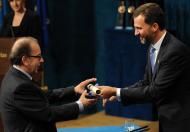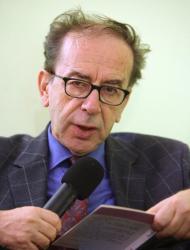He
has been tipped many times as a winner of the Nobel literature prize
but has never won it -- and Albanian novelist Ismail Kadare isn't
bothered if he never does.
So often has his name been mentioned as a potential Nobel laureate
that "many people think I've already won it", the 79-year-old told AFP
in an interview conducted in French in Jerusalem. Kadare, Albania's best-known novelist and poet, was in the city to receive the Jerusalem Prize for work which best expresses and promotes the idea of the freedom of the individual in society -- an award previously won by authors such as Arthur Miller, Haruki Murakami and Ian McEwan.
The award is presented at the opening of the biennial Jerusalem International Book Fair, Israel's largest literary event, which this year has attracted more than 200 publishers from 20 countries.
The prize is yet another accolade for an author whose works have been translated into dozens of languages and who is considered to be one of the greatest living writers in Europe.
Born in 1936 in the Albanian mountain town of Girokaster, Kadare has won a number of prestigious prizes including the first international Man Booker Prize in 2005.
- Surge of interest -
He established an uneasy modus vivendi with the Communist authorities until their attempts to turn his reputation to their advantage drove him in 1990 to seek asylum in France, according to a short bio on the Man Booker Prize website.
His first novel, "The General of the Dead Army", was published in 1963 and then translated into French in 1970, sparking a surge of European and international interest in his work.
He has since written more than 50 novels, essays and collections of short stories, among them "Chronicle in Stone" (1971) and "The Palace of Dreams" (1981) -- many touching on the historical experiences of the Albanian people and the totalitarian regime they endured.
For Kadare, the concept of freedom is an intrinsic part of a writer's work.
"That goes without saying. If you are a serious writer or just a normal one, in one way or another you are writing in the service of freedom. All writers know, understand or dream that their work will be in the service of freedom," he told AFP.
But he refused to be drawn on the question of freedom as it relates to Palestinians living in the annexed eastern part of Jerusalem.
"I did not ask myself that question. I am a writer. I write literature," he said.
- Deadly Paris attacks -
"I come from one of the few countries in the world which helped the Jews during World War II. I believe the number of Jews there grew from 200 at the start of the war to 2,000 by the end.
"The population always defended the Jews whether during the kingdom, under Communism or after it. That is why I haven't thought about this other problem here," he said of the decades-long conflict with the Palestinians.
In an editorial in Le Monde following last month's deadly attacks in Paris, Kadare spoke of Europe as the continent which had "given the most" to the world in terms of literature and art.
"We cannot deny that 80 or even 90 percent of the spiritual treasures from the past 3,000 years have come from Europe," he said.
"There is no other Greek theatre anywhere else in the world. There is no other Shakespeare, Dante or Cervantes."
Although he has been tipped several times as a Nobel laureate, he has yet to receive a call from the Swedish Academy. But it is not something which keeps him awake at night.
"The press has spoken about it so much that many people think that I've already won it," he said.
"I am already part of the family of those who have been tipped, and that is very important. It would be petty and silly to become resentful over that. You won't become divine if you win it. And it's not a disaster if you don't."




No comments:
Post a Comment